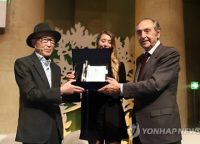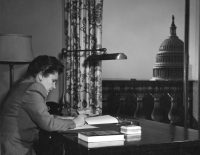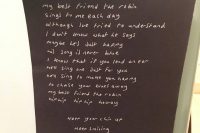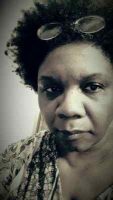February 8, 2017
Edited by David Sanders
Specimen Days
1552 Agrippa d'Aubigné, French poet and soldier (d. 1630), is born.
1612 Samuel Butler, England, poet/satirist (Hudibras) (baptized), is born.
1911 Elizabeth Bishop, US poet (North & South)/Pulitzer Prize (1956), is born.
1943 Pirzada Qasim, Pakistani poet and VC of Karachi University, is born.
1979 Nikolay Semyonovich Tikhonov, Russian poet, dies at 82.
1989 Maurits Kok, Dutch writer/poet (Railroad Strike), dies at 81.
1993 Casper van den Berg, Dutch poet (Fashionable inconvenience), dies.

I said to myself: three days
and you'll be seven years old.
I was saying it to stop
the sensation of falling off
the round, turning world.
into cold, blue-black space.
But I felt: you are an I,
you are an Elizabeth,
you are one of them.
—from “In the Waiting Room” by Elizabeth Bishop
“I said to myself: three days / and you’ll be seven years old. / I was saying it to stop / the sensation of falling off / the round, turning world.” – Elizabeth Bishop
World Poetry
This Poem is Now the Rallying Call for Refugees: “No one leaves home unless home is the mouth of a shark”
“No one leaves home unless/home is the mouth of a shark.” The line, by British Somali poet Warsan Shire, has become a rallying call for refugees and their advocates. Demonstrators at rallies this weekend against US president Donald Trump’s recent ban on citizens from Muslim-majority countries held up signs with lines from Shire’s poem, “Home.” A university instructor read it out loud at a protest in Omaha.
Mexican Poet Wins Almuñecar Award

The jury comprised writer, Ayes Tortosa; poet, Trinidad Gan; author, Jorge Galan and Javier Bozalongo. After intense debate they ‘unanimously’ decided to award the prize to the poet for her work La Chica que se quedado sola. Mariel Martínez Damián, is a student of Hispanic literature at the National Autonomous University of Mexico and of biology at the National Polytechnic Institute and defines herself as half-scientist, half- poet.
Poet Ko Un Awarded Global Honor in Rome

Renowned South Korean poet Ko Un has received an award from Fondazione Roma, a leading cultural foundation in Italy. Ko was chosen as the fourth overall and the first Asian recipient of the annual award presented to an international poet at the foundation’s “Ritratti di Poesia” international poetry festival.
Rimbaud's Drawings, Poem Up for Auction
The first known drawings by French poet Arthur Rimbaud and handwritten poem given to his lover Paul Verlaine will go under the hammer in Paris on February 8. Seven drawings, sketched in 1865 when Rimbaud was 10, are up for auction. They are valued by auction house Sotheby's at between 100,000 and 150,000 euros.
"These exceptional drawings, still privately owned, are the only ones that have been attributed with certainty to the poet," Sotheby experts Frederique Parent and Benoit Puttemans wrote in the presentation of the works. "They reflect the universe of a young poet who is already critical of the world around him."
Renowned South Korean poet Ko Un has received an award from Fondazione Roma, a leading cultural foundation in Italy.
Recent Reviews
‘Elizabeth Bishop’ Details a Poet’s Life. An Author’s, Too.
by Dwight Garner
Elizabeth Bishop published only 100 poems during her lifetime. Most were concise. “Something needn’t be large,” she maintained, “to be good.” This is true of biographies. I was heartened to see that the text of Megan Marshall’s “Elizabeth Bishop: A Miracle for Breakfast,” before back matter, runs to just 305 pages. Short and sharp: Bishop would have approved.
Why Is a Poet’s First Collection So Important?
by David Orr

If you’re an author who specializes in, say, writing about science for general readers, then your first book will be regarded by most people as . . . the book you wrote first. That it was your inaugural effort will have no special significance; your work will be judged the way books are typically judged: as interesting or dull. But if your goal is to write about the imaginary lives of imaginary people or — particularly — to write poems, then your first book may be another matter entirely.
The Lonely Dream
On Rae Armantrout’s Partly: New and Selected Poems, 2001–2015
by Vidyan Ravinthiran
“It is easier to think,” wrote Keats to John Taylor, “what Poetry should be than to write it — and this leads me on to another axiom. That if Poetry comes not as naturally as the Leaves to a tree it had better not come at all.” Bouncing ludically onward, Keats is, in his correspondence, at once the Romantic genius parading his licensed idiosyncrasies and the “camelion Poet” with no identity at all. This famous letter presents us with the drama of consciousness. Reading it, one agrees with Rae Armantrout in her interview with Prac Crit: “objections could be raised to a human consciousness being a unified thing.
Deaths of the Poets by Paul Farley and Michael Symmons Roberts – the high price of poetry
by Blake Morrison
Not the lives of poets, which Dr Johnson wrote about, but their deaths – whether early or late, in bed or in battle, accidental or self-inflicted. It’s a great idea for a book but one that could easily descend into ghoulish sensationalism or slick postmortem psychologising. It helps that the authors are poets themselves, whose agenda isn’t to rubberneck or lecture but to interrogate the Romantic myth “that great poems come at a heavy – ultimately fatal – price”.
Donika Kelly’s new — and first — book is called BESTIARY, and it is in many respects a typical poetic debut.
Broadsides
Whitman, Stevens, & Co.
By Anthony Madrid
I haven’t checked, but I’m confident someone before me will have remarked on the similarity between the beginnings of Walt Whitman’s “Out of the Cradle Endlessly Rocking” and Philip Levine’s “They Feed They Lion.”
Date and Time, Please: The Strangeness of Time-Stamped Poetry
by Anne Holmes

There’s a history of poems responding to particular events and specific dates—we call these occasional poems—but it is rare for a poem to include an actual month-day-year date in its lines. “In the Waiting Room,” an iconic poem by our 8th U.S. Consultant in Poetry Elizabeth Bishop, ends with a date that is 99 years ago this week.
“In the Waiting Room,” an poem by our 8th U.S. Consultant in Poetry Elizabeth Bishop, ends with a date that is 99 years ago this week.
Drafts & Fragments
Scathing Donald Trump Poem Wins New Zealand Competition
by Hamish McNeilly

A New Zealand poetry competition has been taken out by a Scottish poet poking fun at Donald Trump. Lorna Wallace hopes the new American president gets to read her poem. The piece – A Scot' s Lament fur her American Fellows (Oan their election of a tangerine gabshite walloper) – won the Robert Burns Poetry Competition organised by the Dunedin Public Libraries and The Dunedin Burns Club.
51 Immigrant Poets – An interactive map on the ‘Muslim ban’
by Joanne Jeffries and Julian Yanover
In light of recent events concerning Donald Trump’s refugee ban, which has, for the moment, been stopped in its tracks by US judge James Robart, we decided to delve a bit deeper into the lives of poets that have moved to the U.S. and who, if the ban was effective at the time, may never have been able to tread on US soil.
Multiple Isle of Wight Hairdressers Receive Mystery Poem from ‘Banksy of Poetry’

Hairdressers in Ventnor and Freshwater are among those across the country who have received mystery poems from writer, ‘Mark Jones’. He’s been dubbed the ‘Banksy of Poetry’ for randomly sharing his poetry with others.
Feature: Poetry
Needed: Information about forthcoming books of or about poetry that comment, broadly speaking, on social issues and current events, including the 2016 presidential election, Trump's presidency, and other events that have made news headlines in roughly the past two years.
A New Zealand poetry competition has been taken out by a Scottish poet poking fun at Donald Trump.
Poetry In the News
Thomas Lux, Esteemed Georgia Tech Teacher and Poet, Dies

Distinguished by his booming laugh, his arresting poetry readings and his passion for baseball, Bourne Professor of Poetry at Georgia Tech Thomas Lux, was a self-described “literary oddball” who threw himself into teaching while remaining a dedicated master of the craft. After weekly readings at Georgia Tech, “he would invite everyone who was at the reading to come to his house, and everyone would,” said Jericho Brown, associate professor of English and creative writing at Emory University. “I would say he was an idol of mine."
Poet Wins Claremont’s $100,000 Tufts Prize for 2017

A poet known for her explorations of racial identity, modernist poetics and feminist legacies is this year’s winner of Claremont Graduate University’s $100,000 Kingsley Tufts Poetry Award. Poetry magazine Editor Don Share and CGU Interim President Jacob Adams phoned Vievee Francis this week to inform her she won the $100,000 award for her poetry collection, “Forest Primeval,” according to a university press release issued Tuesday. “Francis is reclaiming modernist and feminist legacies of poetry, and it takes great courage to do that,” Share said in a statement.
Jean Valentine Wins Yale’s 2017 Bollingen Prize for Poetry, 50th Poet to be Honored

Jean Valentine has been named the winner of Yale’s 2017 Bollingen Prize for American Poetry. She is the 50th poet to be honored with the award and joins a list of past winners that includes Ezra Pound, Wallace Stevens, John Crowe Ransom, and Marianne Moore, as well as contemporary poets Susan Howe, Charles Wright, and Nathaniel Mackey. The Bollingen Prize, established by Paul Mellon in 1949, is awarded biennially by the Yale University Library through the Beinecke Rare Book and Manuscript Library to an American poet for the best book published during the previous two years or for lifetime achievement in poetry. The prize includes a cash award of $165,000.
Jean Valentine has been named the winner of Yale’s 2017 Bollingen Prize for American Poetry.
New Books
Cinder: New and Selected Poems by Susan Stewart
[Hardcover] Graywolf Press, 256 pp., $25.00

Cinder: New and Selected Poems gathers for the first time poetry from across Susan Stewart’s thirty-five-year career, including many extraordinary new poems. From brief songs to longer meditative sequences, and always with formal innovation and exquisite precision, Stewart evokes the innocence of childhood, the endangered mysteries of the natural world, and deeply felt perceptions, both acute and shared.
“Stewart explores our insatiable desire to remember and make meaning out of this remembering,” Ange Mlinko writes in The Nation. “Stewart’s elegiac bent has broadened, over time, from the personal lyric . . . to what might be called the cultural lyric. Fewer and fewer of her poems reference what she alone remembers; they are about what you and I remember.”
You, Too, Could Write a Poem by David Orr
[Paperback] Penguin Books, 400 pp., $18.00
Poetry is never more vital, meaningful, or accessible than in the hands of David Orr. In the pieces collected here, most of them written originally for the New York Times, Orr is at his rigorous, conversational, and edifying best. Whether he is considering the careers of contemporary masters, such as Louise Glück or Frederick Seidel, sizing up younger American poets, like Matthea Harvey and Matthew Zapruder, or even turning his attention to celebrities and public figures, namely Oprah Winfrey and Stephen Fry, when they choose to wade into the hotly contested waters of the poetry world, Orr is never any less than fully persuasive in arguing what makes a poem or poet great—or not. After all, as Orr points out in his introduction, “Poetry is a lot like America, in the sense that liking all of it means that you probably shouldn’t be trusted with money, or scissors.”
The Book of Endings by Leslie Harrison
[Paperback] University of Akron Press, 88 pp., $14.95

The poems in The Book of Endings try to make sense of, or at least come to some kind of reckoning with absence-the death of the author's mother, the absence of the beloved, the absence of an accountable god, cicadas, the dead stars arriving, the dead moon aglow in the night sky.
Rowing Inland by Jim Daniels
[Paperback] Wayne State University Press, 96 pp., $16.99
Rowing Inland, Jim Daniels's fifteenth book of poetry is a time machine that takes the reader back to the Metro Detroit of his youth and then accelerates toward the future. With humor and empathy, the author looks at his own family's challenges and those of the surrounding community where the legacy handed down from generation to generation is one of survival. The economic hits that this community has to endure create both an uncertainty about its future and a determined tenacity.
Escape Velocity by Bonnie Arning
[Paperback] Center for Literary Publishing, 78 pp., $16.95

From the moment of a marriage’s heated inception to its period of luminous crowding and onward into distance and darkness, Bonnie Arning’s Escape Velocity asks if it’s possible to exist outside the only universe we’ve ever known. In modes both lyric and narrative, we are given a peephole into the height and decline of a marriage that begins beneath the moving lights of Las Vegas, Nevada, and traverses the devastating terrain of gambling, miscarriage, infidelity, and violence. Arning gives voice to divergent aspects of love and violence through her use of math problems, erasures, dictionary entries, structured stanzas, and sprawling free verse.
The Book of Endings tries to make sense of, or at least come to a kind of reckoning with the death of the author’s mother.
Correspondences
Pablo Neruda, The Art of Poetry
by Rita Guibert
“I have never thought of my life as divided between poetry and politics,” Pablo Neruda said in his September 30, 1969, acceptance speech as the Chilean Communist Party candidate for the presidency. “I am a Chilean who for decades has known the misfortunes and difficulties of our national existence and who has taken part in each sorrow and joy of the people. I am not a stranger to them, I come from them, I am part of the people. I come from a working-class family . . . I have never been in with those in power and have always felt that my vocation and my duty was to serve the Chilean people in my actions and with my poetry. I have lived singing and defending them.”
Conversation With Saint Lucian Poet Vladimir Lucien
by Nandini Majumdar

Born in Saint Lucia in 1988, Vladimir Lucien won the Caribbean region’s major literary prize for Anglophone literature – the OCM Bocas Prize – in 2015, for Sounding Ground, his debut collection. At the Jaipur Literature Festival 2017, he spoke to The Wire about the need for a writer to be connected to the people, about what it mean to him to be called a ‘Caribbean poet’, and more.
Born in Saint Lucia in 1988, Vladimir Lucien won the the OCM Bocas Prize in 2015
Envoi: Editor’s Notes
Lessons from the Past: Rilke
So you must not be frightened if a sadness rises up before you larger than any you have ever seen; if a restiveness, like light and cloudshadows, passes over your hands and over all you do. You must think that something is happening with you, that life has not forgotten you, that it holds you in its hand; it will not let you fall. Why do you want to shut out of your life any uneasiness, any miseries, or any depressions? For after all, you do not know what work these conditions are doing inside you.”
― Rainer Maria Rilke, Letters to a Young Poet
“You must not be frightened if a sadness rises up before you larger than any you have ever seen.” – Rainer Maria Rilke